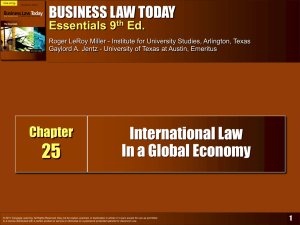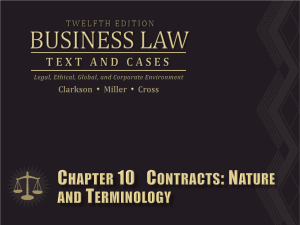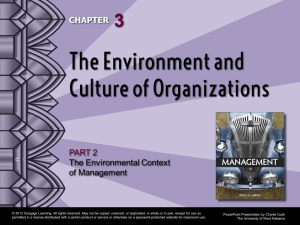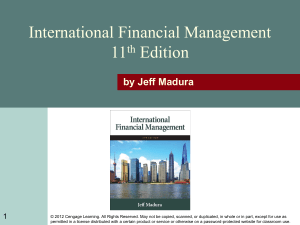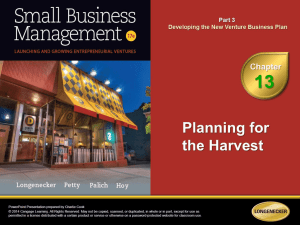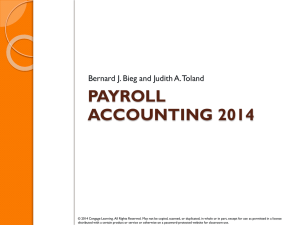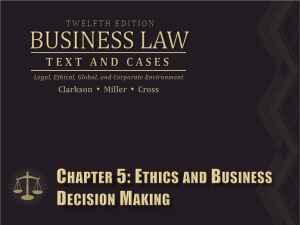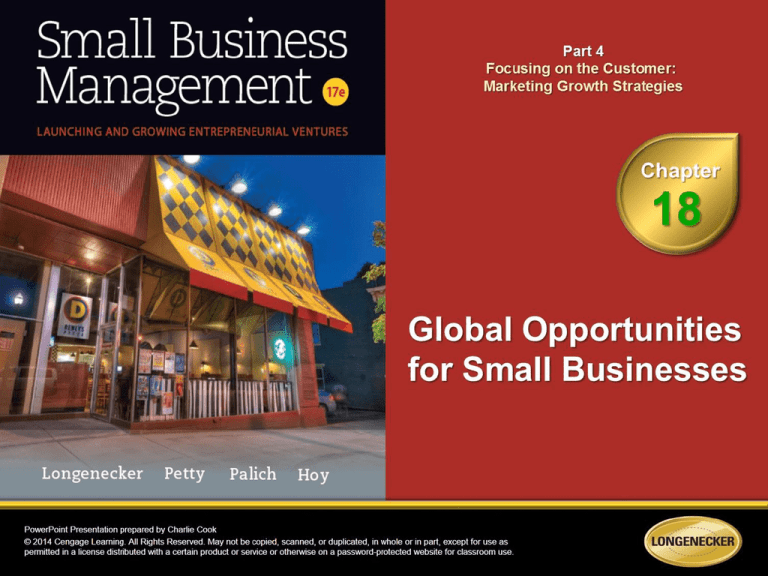
1. Describe the potential of small firms as global
enterprises.
2. Identify the basic forces prompting small firms
to engage in global expansion.
3. Understand and compare strategy options for global
businesses.
4. Explain the challenges that global enterprises face.
5. Recognize the sources of assistance available
to support international business efforts.
© 2014 Cengage Learning. All Rights Reserved. May not be copied, scanned, or duplicated, in whole or in part, except for use as
permitted in a license distributed with a certain product or service or otherwise on a password-protected website for classroom use.
18–2
Small Businesses as Global Enterprises
• Globalization
The expansion of international business:
Converging market preferences
Falling trade barriers
Integration of national economies.
• Born-Global Firms
Small companies launched with
cross-border business activities in mind
Size does not necessarily limit a firm’s international
activity—small companies can build upon their unique
resources to become global competitors.
© 2014 Cengage Learning. All Rights Reserved. May not be copied, scanned, or duplicated, in whole or in part, except for use as
permitted in a license distributed with a certain product or service or otherwise on a password-protected website for classroom use.
18–3
Questions Before Going Global
• What are management’s objectives?
Reasons, commitment, expected payoff
• How prepared is management to go global?
Expertise, responsibility for and time allocated to
international operations, organizational structure
• Is there sufficient production capacity?
Present capacity, effect of international operations on
local production
• Is there enough financial capacity?
Capital available for marketing, expansion, payback
© 2014 Cengage Learning. All Rights Reserved. May not be copied, scanned, or duplicated, in whole or in part, except for use as
permitted in a license distributed with a certain product or service or otherwise on a password-protected website for classroom use.
18–4
18.1
Where in the World Are Entrepreneurial Companies Doing Business?
© 2014 Cengage Learning. All Rights Reserved. May not be copied, scanned, or duplicated, in whole or in part, except for use as
permitted in a license distributed with a certain product or service or otherwise on a password-protected website for classroom use.
18–5
18.2
Questions to Consider Before Going Global
© 2014 Cengage Learning. All Rights Reserved. May not be copied, scanned, or duplicated, in whole or in part, except for use as
permitted in a license distributed with a certain product or service or otherwise on a password-protected website for classroom use.
18–6
Before Going Global
• Decide if firm is up to the task of globalization.
• Study the social, technological, economic, and
political forces in foreign markets.
North American Free Trade Agreement (NAFTA)
European Union (EU)
• Prepare to modify products to meet
design specifications that may vary
from country to country.
© 2014 Cengage Learning. All Rights Reserved. May not be copied, scanned, or duplicated, in whole or in part, except for use as
permitted in a license distributed with a certain product or service or otherwise on a password-protected website for classroom use.
18–7
Expanding into International Markets
Gaining Access
to Resources
Cutting
Costs
Factors in
Competing
Internationally
Capitalizing on
Special Features
of Location
© 2014 Cengage Learning. All Rights Reserved. May not be copied, scanned, or duplicated, in whole or in part, except for use as
permitted in a license distributed with a certain product or service or otherwise on a password-protected website for classroom use.
18–8
The Forces Driving Global Businesses
Expanding Markets
Traditional motivation: Extend the product life cycle.
EMERGING MOTIVATION:
FIND BUYERS FOR HIGHLY SPECIALIZED PRODUCTS.
Gaining Access
to Resources
Cutting
Costs
Traditional motivation:
Find raw materials.
Traditional motivation:
Reduce labor and transportation costs.
EMERGING MOTIVATION:
OBTAIN HUMAN RESOURCES.
EMERGING MOTIVATION:
OBTAIN TARIFF REDUCTIONS
Capitalizing on Special Features of Location
Traditional motivation: Profit from unique local features,
EMERGING MOTIVATION:
FOLLOW LARGE CLIENT FIRMS THAT LOCATE ABROAD
© 2014 Cengage Learning. All Rights Reserved. May not be copied, scanned, or duplicated, in whole or in part, except for use as
permitted in a license distributed with a certain product or service or otherwise on a password-protected website for classroom use.
18–9
18.3
BRIC Markets
© 2014 Cengage Learning. All Rights Reserved. May not be copied, scanned, or duplicated, in whole or in part, except for use as
permitted in a license distributed with a certain product or service or otherwise on a password-protected website for classroom use.
18–10
Expanding into International Markets:
Making the Most of Experience
• Experience Curve Efficiencies
Per-unit savings gained from the repeated production
of the same good.
• Learning Effects
Insights gained from experience, that lead
to improved work performance.
• Economies of Scale
Efficiencies that result from
the expansion of production.
© 2014 Cengage Learning. All Rights Reserved. May not be copied, scanned, or duplicated, in whole or in part, except for use as
permitted in a license distributed with a certain product or service or otherwise on a password-protected website for classroom use.
18–11
Cutting Costs
• International Outsourcing
A strategy that involves accessing foreign
business operations through contracts with
independent providers.
• Offshoring
A strategy that involves relocating
operations abroad.
© 2014 Cengage Learning. All Rights Reserved. May not be copied, scanned, or duplicated, in whole or in part, except for use as
permitted in a license distributed with a certain product or service or otherwise on a password-protected website for classroom use.
18–12
Strategy Options for Global Firms
Locating facilities
abroad
International
strategic alliances
International
franchising
Exporting
Global
Strategy
Options
Importing
Foreign
licensing
© 2014 Cengage Learning. All Rights Reserved. May not be copied, scanned, or duplicated, in whole or in part, except for use as
permitted in a license distributed with a certain product or service or otherwise on a password-protected website for classroom use.
18–13
Strategy Options for Global Firms
• Exporting
Selling products produced in the home country to
customers in another country.
Low-cost way to expand into international markets
Ease of selling on the Web has fueled export activity.
• Exporting Challenges
Communicating in a foreign language
International shipping
Product modification
Governmental regulations and relations
Currency exchange rates and payment methods
© 2014 Cengage Learning. All Rights Reserved. May not be copied, scanned, or duplicated, in whole or in part, except for use as
permitted in a license distributed with a certain product or service or otherwise on a password-protected website for classroom use.
18–14
Strategy Options for Global Firms (cont’d)
• Importing
Selling goods produced in another country
to buyers in the home country.
Success requires finding a good product vendor.
• Global Sourcing Strategy
Connecting with overseas suppliers
that can provide products or services
a firm needs to operate successfully.
© 2014 Cengage Learning. All Rights Reserved. May not be copied, scanned, or duplicated, in whole or in part, except for use as
permitted in a license distributed with a certain product or service or otherwise on a password-protected website for classroom use.
18–15
Strategy Options for Global Firms (cont’d)
• Foreign Licensing
Allowing a firm in another country to purchase
the right to manufacture and sell a firm’s
products in international markets.
Licensee—the company buying the licensing rights
Licensor—the company selling the licensing rights
Royalties
Fees paid by the licensee to the licensor for each unit
produced under a licensing contract
Counterfeit activity
© 2014 Cengage Learning. All Rights Reserved. May not be copied, scanned, or duplicated, in whole or in part, except for use as
permitted in a license distributed with a certain product or service or otherwise on a password-protected website for classroom use.
18–16
Strategy Options for Global Firms (cont’d)
• International Franchising
Selling a standard package of products,
systems, and management services to a
firm in another country.
• International Strategic Alliances
A combination of efforts and/or assets of
firm in different countries for the sake of
pooling resources and sharing the risks of
an enterprise.
© 2014 Cengage Learning. All Rights Reserved. May not be copied, scanned, or duplicated, in whole or in part, except for use as
permitted in a license distributed with a certain product or service or otherwise on a password-protected website for classroom use.
18–17
Strategy Options for Global Firms (cont’d)
• Locating Facilities Abroad
Cross-border acquisition
The purchase by a business in one country
of a company located in another country
Greenfield venture
A wholly owned subsidiary formed
“from scratch” in another country
© 2014 Cengage Learning. All Rights Reserved. May not be copied, scanned, or duplicated, in whole or in part, except for use as
permitted in a license distributed with a certain product or service or otherwise on a password-protected website for classroom use.
18–18
Challenges to Global Business
• Political Risk
The potential for political forces in a country to
negatively affect the performance of businesses
operating within.
• Economic Risk
The probability government mismanagement of the
economy changes the business environment in ways
that hinder the performance of firms operating there.
Exchange rate—the value of one country’s currency relative
to that of another country. Variations in currency values
affects the profitability of international trade deals.
© 2014 Cengage Learning. All Rights Reserved. May not be copied, scanned, or duplicated, in whole or in part, except for use as
permitted in a license distributed with a certain product or service or otherwise on a password-protected website for classroom use.
18–19
18.4
Ease of Doing Business
© 2014 Cengage Learning. All Rights Reserved. May not be copied, scanned, or duplicated, in whole or in part, except for use as
permitted in a license distributed with a certain product or service or otherwise on a password-protected website for classroom use.
18–20
Challenges to Global Business (cont’d)
• Managerial Limitations
Product planning
Marketing
Finance
Management
Accounting
Legal issues
© 2014 Cengage Learning. All Rights Reserved. May not be copied, scanned, or duplicated, in whole or in part, except for use as
permitted in a license distributed with a certain product or service or otherwise on a password-protected website for classroom use.
18–21
Assistance for Global Enterprises
• Analyzing Markets and Planning Strategies
Small Business Administration resources
U.S. Export Assistance Centers (USEACs)
Publications: SBA’s Breaking into the Trade Game: A Small
Business Guide to Exporting
Department of Commerce
International Trade Administration
Speak to a recent returnee
Visit the foreign country
© 2014 Cengage Learning. All Rights Reserved. May not be copied, scanned, or duplicated, in whole or in part, except for use as
permitted in a license distributed with a certain product or service or otherwise on a password-protected website for classroom use.
18–22
Assistance for Global Enterprises (cont’d)
• Connections With International Customers
Trade leads
Trade missions
Trade intermediaries
© 2014 Cengage Learning. All Rights Reserved. May not be copied, scanned, or duplicated, in whole or in part, except for use as
permitted in a license distributed with a certain product or service or otherwise on a password-protected website for classroom use.
18–23
18.5
Trade Intermediaries Most Suited for Small Business
© 2014 Cengage Learning. All Rights Reserved. May not be copied, scanned, or duplicated, in whole or in part, except for use as
permitted in a license distributed with a certain product or service or otherwise on a password-protected website for classroom use.
18–24
Financing Assistance for
Global Enterprises
• Private Banks
Letter of credit
An agreement issued by a bank to honor a draft or other
demand for payment when specified conditions are met.
Bill of lading
A document indicating that a product has been shipped and
the title to that product has been transferred.
• Small Business Administration
Financial assistance programs
http://www.sba.gov/content/financing-your-small-businessexports-foreign-investments-or-projects.
© 2014 Cengage Learning. All Rights Reserved. May not be copied, scanned, or duplicated, in whole or in part, except for use as
permitted in a license distributed with a certain product or service or otherwise on a password-protected website for classroom use.
18–25
Key Terms
bill of lading
born-global firms
counterfeit activity
cross-border acquisition
economic risk
economies of scale
exchange rate
experience curve efficiencies
exporting
foreign licensing
globalization
greenfield venture
importing
international franchising
international outsourcing
international strategic alliance
learning effects
letter of credit
licensee
licensor
offshoring
political risk
royalties
trade intermediary
trade mission
© 2014 Cengage Learning. All Rights Reserved. May not be copied, scanned, or duplicated, in whole or in part, except for use as
permitted in a license distributed with a certain product or service or otherwise on a password-protected website for classroom use.
18–26


